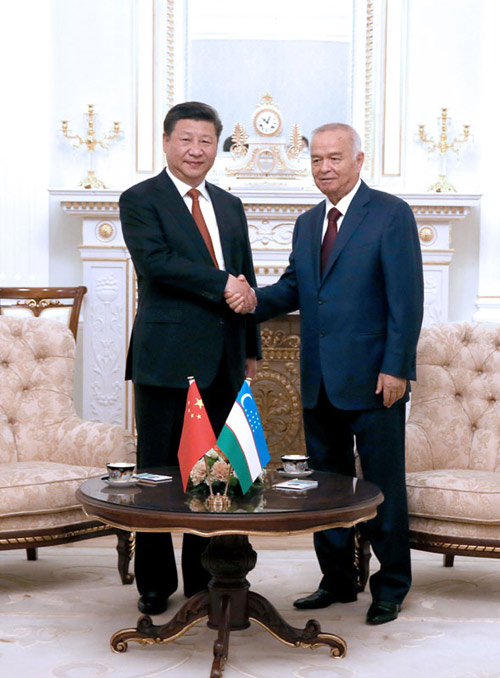China, Uzbekistan agree to focus on Belt and Road development
(Xinhua) Updated: 2016-06-23 03:42
 |
|
Chinese PresidentXi Jinping(L) holds talks with Uzbek President Islam Karimov in Tashkent, Uzbekistan, June 22, 2016. [Photo/Xinhua] |
TASHKENT -- China and Uzbekistan agreed on Wednesday to focus on jointly promoting the China-proposed Belt and Road Initiative.
During the talks between visiting Chinese President Xi Jinping and his Uzbek counterpart, Islam Karimov, the two sides pledged to seek synergy between their respective development strategies and fully tap into the potential of their economic and trade cooperation on the principles of consultation, joint development and sharing.
The two leaders said they will actively boost industrial capacity cooperation and build the Jizzakh Industrial Park into an important platform in this regard.
Cooperation in infrastructure construction and energy will be expanded and deepened, and new highlights will be created in agricultural cooperation.
The two heads of state also vowed to increase financial support for major cooperation projects between the two countries.
"We should comprehensively deepen our practical cooperation in all fields ... to push for the common development of our two countries and enrich the meaning of our comprehensive strategic partnership with more cooperation outcomes," Xi told Karimov.
The Belt and Road Initiative, proposed by Xi in 2013, refers to the building of the Silk Road Economic Belt and the 21st-Century Maritime Silk Road. It is aimed at building a trade and infrastructure network connecting Asia with Europe and Africa along the ancient trade routes.
Xi arrived in the Central Asian country on Tuesday for a state visit, the second in three years. He will also attend a summit of the Shanghai Cooperation Organization (SCO).
During the talks, the two leaders agreed to elevate the bilateral ties to a comprehensive strategic partnership so as to cement traditional friendship and deepen mutually beneficial cooperation.
They decided to continue to strengthen mutual support on issues concerning their core interests such as territory, sovereignty and security, render strong support to each other in their choices of development paths, and enhance communication and coordination on major international and regional issues.
- China, Uzbekistan elevate ties to comprehensive strategic partnership
- Central Asia and Uzbekistan are crucial for China's Belt and Road Initiative
- Xi tours 'living fossil of Silk Road' Bukhara in Uzbekistan
- Chinese president starts Uzbekistan visit in historical city Bukhara
- Mandarin fever in Uzbekistan




